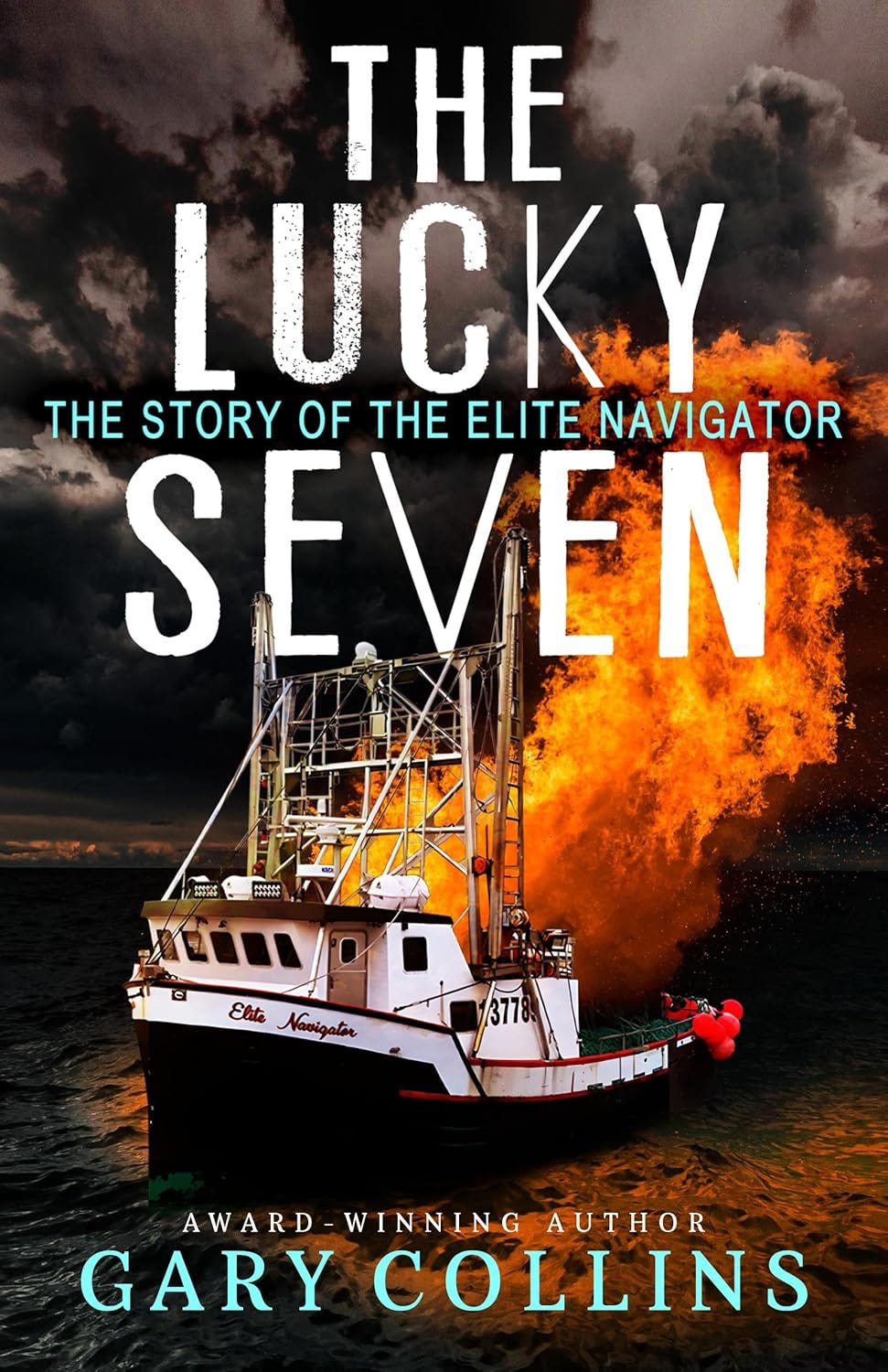The Lucky Seven: The Story of the Elite Navigator by Gary Collins
A modern-day disaster at sea
Having grown up in southeastern Ontario, far removed from the realities of maritime life, I rarely gave any thought to the origins of the seafood I consumed—whether the fish in my fish and chips or the shellfish served in upscale restaurants. My understanding of fishing was limited to freshwater angling during summers at our family cottage, far from the rugged North Atlantic where Canada’s deep-sea fisheries are based.
Although I had seen The Perfect Storm (2000), I regarded the film's fishermen as reckless for venturing so far from shore. At the time, I had little comprehension of the historical and ongoing significance of commercial fishing in Atlantic Canada, or of the individuals—men and women—who risk their lives at sea in pursuit of their livelihood.
Gary Collins’s The Lucky Seven stands in marked contrast to the grim events upon which The Perfect Storm is based. The title itself signals the positive outcome of a harrowing ordeal. Collins, an award-winning Newfoundland author of both fiction and non-fiction, brings a deeply rooted cultural understanding to this recent event, which took place in July 2024. His previous works include The Last Beothuk, which explores Indigenous-settler relations, and Left to Die, a historical account of the SS Newfoundland sealing disaster of 1914. Collins’s continued focus on Newfoundland’s maritime past and present reflects a commitment to documenting the province’s (and former British colony) distinct historical experiences within the Canadian narrative.
What distinguishes The Lucky Seven from Collins’s earlier work is the immediacy of its subject matter. The seven crew members of the longliner Elite Navigator survived the incident and were able to share their personal recollections with the author. Their testimonies are complemented by accounts from Canadian Coast Guard personnel and members of the Gander 103 Search and Rescue Squadron, who conducted the complex rescue operation under perilous conditions. The story highlights that, even in the 21st century, with sophisticated vessels and advanced navigation systems, elemental forces such as fire and fog remain existential threats at sea.
Collins traces the events with deliberate pacing, mirroring the rhythm of the ocean itself. Each of the seven crew members—mostly young Newfoundlanders with families—embody a continuing tradition of North Atlantic fishery labour. Their vessel departs port, reaches productive Turbot fishing grounds, and, after securing a full catch, begins the return journey. However, disaster strikes when fire breaks out onboard, forcing an abrupt evacuation. Several crew members are unable to retrieve their survival suits before leaping into the sea. Only one of the vessel’s two life rafts inflates properly, adding further danger to an already dire situation. To compound matters, dense fog enshrouds the area, obscuring visibility and complicating rescue efforts.
The book, which includes numerous black-and-white photographs, serves not only as a gripping survival narrative but also as an important cultural document. Published by Flanker Press, an independent Newfoundland press known for preserving regional stories, The Lucky Seven contributes to the broader tapestry of Canadian maritime history. Collins's narrative style, while accessible, is never sentimental. Instead, he maintains a respectful, grounded tone that honours the courage and resilience of those whose livelihoods are tied to the sea.
In sum, The Lucky Seven is more than a tale of survival—it is a contemporary addition to Canada’s long history of maritime endeavour. It will be of particular interest to readers of Canadian history, especially those focused on Newfoundland and Labrador, as it vividly illustrates how traditional fishing practices and community values persist in the face of modern challenges at sea.
About the Author
Gary Collins is Newfoundland and Labrador’s favourite storyteller, and today he is known all over the province as the Story Man. He lives in Hare Bay with his wife, the former Rose Gill. They have three children and seven grandchildren.
About the Reviewer
James M. Fisher is the Founding Editor and present Editor-in-Chief of The Seaboard Review of Books. He lives in Miramichi New Brunswick with his wife Diane, their Tabby cat Eddie and Buster the Border Collie. James works as an MRI Technologist at the Miramichi Hospital.
Book Details
Publisher : Flanker Press Ltd.
Publication date : May 9 2025
Language : English
Print length : 229 pages
ISBN-10 : 1774572508
ISBN-13 : 978-1774572504




